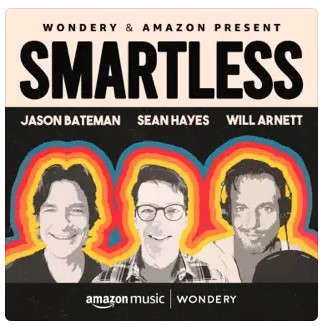Smartless Podcast Review: The Vain Pleasures of “Smartless”

Finding a decent podcast that fits your needs might be challenging. Sometimes you could be in the mood for a podcast that will inspire you or teach you something, or you might want to stay current on the news or your favorite sports team, or you might want some fun and a good narrative.
Three separate hosts can be found on the podcast “Smartless”: Sean Hayes, Will Arnett, and Jason Bateman. They are all close friends, and one of them invites a different well-known celebrity to be interviewed every week.
Read More »The high caliber and variety of guests they can invite is a feature of the show that is greatly appreciated. The hosts can contact and interview some individuals that most would only dream of having on their program, thanks to all the contacts they have gained through being well-known in the entertainment world. Among the visitors, they have been able to interview individuals like Neil Degrasse Tyson, LeBron James, and Tony Hawk. They attract well-known personalities, but they also attract others who, regardless of their famous status, you can see are truly interested in them, which makes for an excellent conversation.
“Smartless” is a podcast most listeners would find entertaining. There is a good chance that you will find a guest in their archive of interviews, which you are already fascinated with or a fan of, but there is also plenty of chance to discover someone new. You can’t go wrong by giving “Smartless” a try if you want to have a good time while learning something new and having a fantastic conversation.
It’s surprising how quickly Smartless has risen. The pandemic-era celebrity podcast hosted by Jason Bateman, Sean Hayes, and Will Arnett only made its debut in the summer of 2020, along with a plethora of other celebrity offerings. However, by the end of the previous year, it had reached the 23rd spot in terms of listenership, according to Edison Research, the most trustworthy independent source on the subject.
Last month, Arnett, Bateman, and Hayes took steps to expand the business surrounding Smartless by hiring a manager to oversee the creation of additional podcasts under the newly renamed Smartless Media banner. The show signed an exclusive multiyear licensing agreement with Amazon Music in June 2021, only a few months old, for a reported $80 million. A live tour that visited six cities and ended on February 12 was held in keeping with what has recently become another indicator of podcast success.
Even the show hosts appear shocked by how quickly it has grown. During a recent interview on Jimmy Kimmel, where he briefly referenced the tour, Bateman remarked, “The whole podcast itself is nuts.” “It’s just four idiots talking on stage, or three idiots and a competent visitor. People pay money to watch stand-up comedy, dance, and sing. We are the only ones talking. He doesn’t finish the sentence, but the meaning is evident.
Smartless is most notable for how unimpressive it is. Not that it is horrible, mind you. Simply put, it’s not very distinct. From afar, Smartless resembles that stale pantomime of a podcast, which features three men chatting with friends and guests, but in this case, the males just so happen to be very well-known actors. This makes the structure of the program have a faintly portfolio-risk-management feel to it:
- Take three reasonably “safe” males working in the entertainment industry.
- Combine their fan bases.
- Observe the downloads roll in.
Unfortunately, SmartLess is only significantly superior to other podcasts in a few areas. Why? Because Arnett, Bateman, and Hayes are best friends, they’re friends who always make fun of one other because their chemistry is contagious. Conan’s podcast feels like an extended bit; Shepard and Maron’s feel like personal long-form interviews, but SmartLess feels like a minor party with good friends who are at ease picking on each other in front of the guests. While simultaneously asking Kamala Harris about the economy’s condition, Arnett can use the phrase “Eat crap, Bateman.” What fun!
Since we’re dealing with three fairly successful performers, at least one or two have a prior relationship with their guests, allowing them to share personal behind-the-scenes tales that haven’t already been revealed for another podcast.
The podcast is set up as a group interview show, with each trio member taking turns selecting the guest each week. Each episode begins with a surprise introduction of the guest to the other two hosts, after which they launch into a typical line of celebrity-interview inquiry. To a certain extent, every interview podcast is fundamentally a program about the interviewers. When taken as a whole, the visitors provide a picture of the hosts’ shared preferences and interests, and the interviews reveal how the hosts view the outside world. Arnett, Bateman, and Hayes exude a general curiosity in this instance.
Although Arnett, Bateman, and Hayes haven’t exactly broken new ground here, it’s good to hear a fresh take on the interview podcast format after years of hearing the same old thing. The three of them are so witty and sharp that I frequently wish they’d do an episode without a guest since their banter is still the best aspect of their program, at least for the first year or two, by which time I’ll also be familiar with all of their anecdotes.
The premise of Smartless is that each week, one “surprise” celebrity guest is invited by each of the three hosts. Someone who was probably familiar to both that host and the other two. Largely friends. But rather than exploring issues or even getting to the core of who they are, they gush over the individual, tell them how amazing they are, and even offer a few anecdotes to support their claims. They occasionally tell amusing stories, most of which center on when Bateman and Arnett were out having fun or acting foolishly. However, it only serves as an odd PR event to lavish the visitor with unreserved praise. This is unpleasant. Not amusing.
Smartless has definite advantages. The trio’s powerful network has resulted in a guest list full of difficult acquisitions and unusual additions that speak to each person’s preferences. LeBron James, Gwyneth Paltrow, Tom Hanks, Robert Downey Jr., Billie Eilish, and their brother Finneas attended. Less well-known guests have included David Remnick, the publisher of the New Yorker, and Formula One racer Daniel Ricciardo. The camaraderie between the three men, especially between Arnett and Bateman, Arnett’s Arrested Development co-stars, is strong enough to produce lighthearted humor and the kind of occasional jokes that Arnett fans would find hilarious. Hayes seemed to care the most about the fairness of the processes out of the three;
The hosts, however, are not particularly skilled interviewers as a group, which tends to detract from the guests’ interestingness. Too unfocused and meandering to make much of an impact. Rarely does the conversation get beyond the superficial and shallow, usually laced with Hollywood smarm (“I admire your work”) and the flimsy liberalism of the entertainment business? (In a recent episode with Adam McKay, Arnett made the statement, “Everything in this country, well, in the world, is driven by profit, as we all know,” as part of a comment decrying corporate greed, despite having received funding from Amazon, a significant symbol of corporate greed.)
This brings up the previous point about how challenging it is to host a talk show. Watching Bateman and Arnett bust one other’s balls can be entertaining. However, there is frequently a deviation from the guest’s account. However, Sean Hayes is oblivious to what a transition is. When the conversation becomes intriguing, the guest will read a question prepared in advance and has no connection with what is being said. It’s also startling. And yes, I know he was “Just Jack,” but I’m not exactly sure what else qualifies him to be on this program. Besides the dubious assertion that he is friends with the other two.
However, criticizing something based solely on what it isn’t is improper. I’ll admit it: There are genuine delights to be discovered in Smartless’ superficialities. This is a show deeply rooted in the comfortable Hollywood lifestyle and consistently evokes in me, at least, a mix of Gary Shteyngartian emotions: a fascination with and scorn for such opulent lives but envy. Therefore, Smartless is recommended if you’re looking for a podcast that offers proximity to showbiz and other imaginative worlds. It’s laid-back, low-stakes, straightforward, and uncomplicated.
The show is also somewhat of an anomaly regarding the history of the Los Angeles-Hollywood celebrity podcast culture. That used to be the territory of outcasts, eccentrics, and off-topic people; it was a place for those who weren’t quite in the middle of things to reflect for viewers on the perplexing challenge of navigating the entertainment industry. Open the Apple Podcast app and follow the trail of strange outsider stories from Marc Maron and Scott Aukerman to Anna Faris, the Office Ladies, and the tale of Dead Eyes. Due to its rapid success and the underlying simplicity of its nature, Smartless appears to offer an odd new direction in the genre. It’s a shift in the direction of the mundane.
For many, this period in podcasting is defined by disagreements and contentious issues: how The Joe Rogan Experience, which is widely regarded as the largest in the world, is also its most problematic; how one of its most dependable subgenres, true crime; how it has also developed into a vibrant space for misleading information; how it is home to speech and ideas that are outside the public consciousness of varying quickness; etc. Smartless, on the other hand, is completely secure. Its success is, therefore, almost offensive. Even more strangely, when considering the entirety of the issues the podcast industry is facing, Smartless’s market attractiveness only increases.





